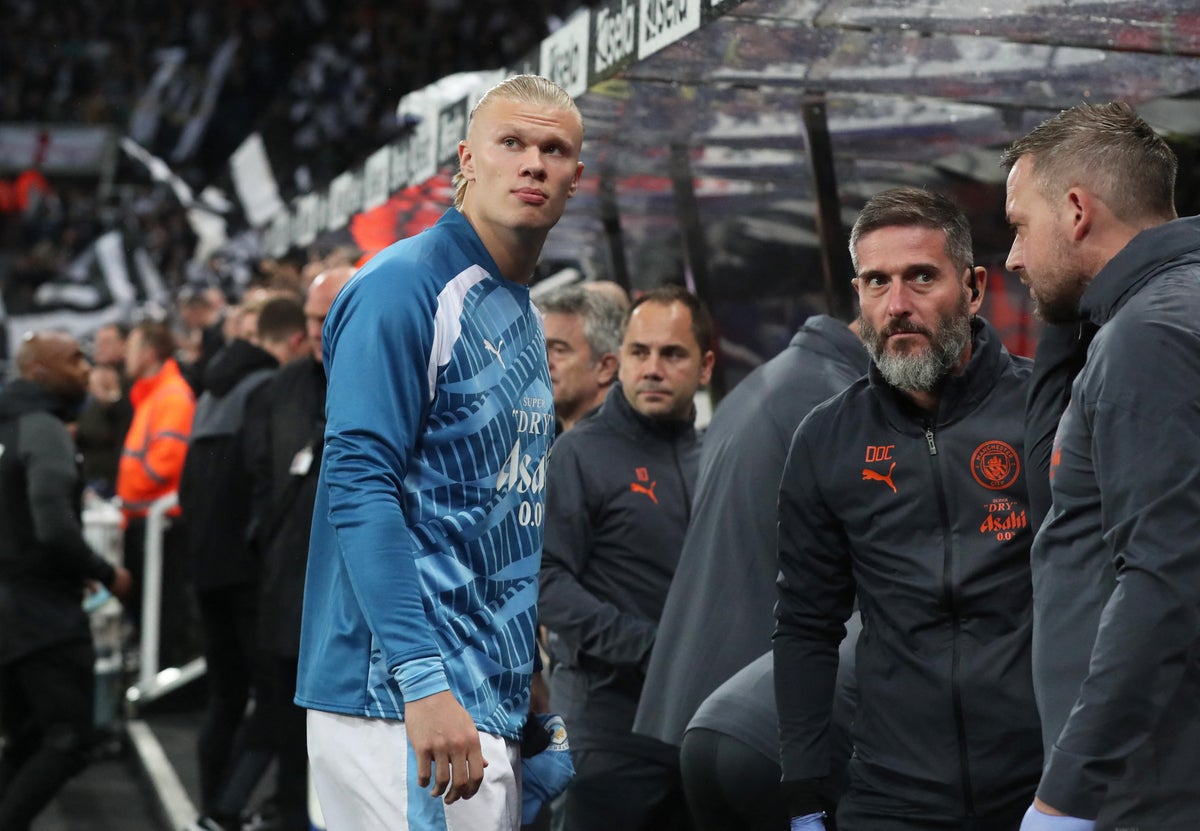
There are problems of having Erling Haaland. Not many, admittedly, and not those that will attract sympathy from Pep Guardiola’s managerial peers: virtually all would love to call upon a 52-goal striker.
The problems of having Haaland may come when a team is deprived of him. It was by Guardiola’s choice as his side exited the Carabao Cup at St James’ Park. Haaland was held in reserve, a substitute in a sizeable Manchester City coat, not summoned when Newcastle scored or as the quadruple Guardiola has long insisted City could not win was rendered impossible before October arrives. Haaland, it transpired, was not the insurance policy if City needed him but, like Kyle Walker and Ruben Dias, he was just making up the numbers on the bench.
Guardiola never considered bringing him on. “Erling had a lot of minutes [in other games],” he explained. Haaland played 53 times for City last season, 30 in an injury-hit final year for Borussia Dortmund. If Guardiola is managing his minutes, he has done it well so far.
So the problem is partly one of Haaland’s creation: removing a goal-a-game striker can seem a bigger loss than omitting one who averages a goal every three. The other issue is that squads, teams and tactics are remodelled around the real outliers. Haaland has changed City – without him, they might not be Champions League winners – but City have changed because of Haaland.
Because he scores so many goals, the profile of the supporting cast has changed: there are fewer alternative scorers. When Haaland had a watching brief at Newcastle, Julian Alvarez, who doubles up as his sidekick and his deputy, led the line. The Argentinian has proved prolific this season. Yet – and with the substantial caveats that these are early days and that several of a much-changed starting 11 have had bit-part roles – the only other man with a goal to his name this season was Nathan Ake. And, Alvarez apart, the Dutch defender may looked the second likeliest scorer on the teamsheet.
Oscar Bobb showcased his talent but has never scored a senior goal. Sergio Gomez, a left-back operating on the right wing, is yet to open his City account. So is Kalvin Phillips, another fringe figure. Mateo Kovacic is a wonderful technician who scored nine times in 330 games for Real Madrid and Chelsea. Jack Grealish had a fine season last year and scored five goals in 50 matches. Because of Haaland, it mattered not.
“We score a lot of goals since I arrive here,” said Guardiola and, with 151 last season, 150 the year before and 149 in 2019-20, he has facts on his side. “The statistics [show] how many goals we score: with different strikers, with wingers, with attacking midfielders.”
Guardiola clashes with Newcastle assistant Jason Tindall— (Getty Images)
Yet that was the model that perhaps suited the collectivist, the total football purist in him, the most: sharing the goals around. City got 131 goals in 2020-21 when no one scored more than 17, but seven players were in double figures. They had a rotating cast of threats. Take the top scorer out and someone else might leapfrog him on the leaderboard.
They were shared out differently last season. Haaland’s 52 accounted for more than a third, even if that still left 99 other goals and five players with at least 10. But two of them – Ilkay Gundogan and Riyad Mahrez – are now gone and a third, Kevin De Bruyne, is a long-term absentee. A fourth, Phil Foden, began on the bench. It left only Alvarez; in that context, Nick Pope’s first-half save from the Argentinian may have been still more important.
And the goalscoring attacking midfielders and wingers are in shorter supply at City now. One summer signing, Matheus Nunes, came off the bench, but he scored once in 40 games for Wolves; it was scarcely a Gundogan-esque return. The August buy Jeremy Doku was another substitute Guardiola used, and he has a fine goal for City to his name already, but he struck fewer times in three seasons for Rennes than Mahrez did in his last year at the Etihad Stadium alone. In hindsight, there was a shift in tactics and responsibilities when Grealish arrived and, a year later, Raheem Sterling departed. The latter was Guardiola’s most potent winger. City entered two Cup finals last season with Grealish and Bernardo Silva starting on the flanks and the more prolific Mahrez and Foden on the bench. In its own way, that was the Haaland effect.
Now the team trying to win the title with a more equitable distribution of goals are Arsenal, under Guardiola’s old assistant Mikel Arteta, and with the criticism they lack their version of Haaland. City can plot a path to 150 or so goals in all competitions but with the marked difference that one player makes a disproportionate contribution. If Haaland cannot play every game, perhaps it was not him they missed at Newcastle but De Bruyne. Yet if only one footballer has ever scored more in a season for Guardiola, the subsequent reliance on him coined a word, Messidependencia. And perhaps, if City have started to accumulate non-scorers, they will have their version of it: Haalanddependencia.







